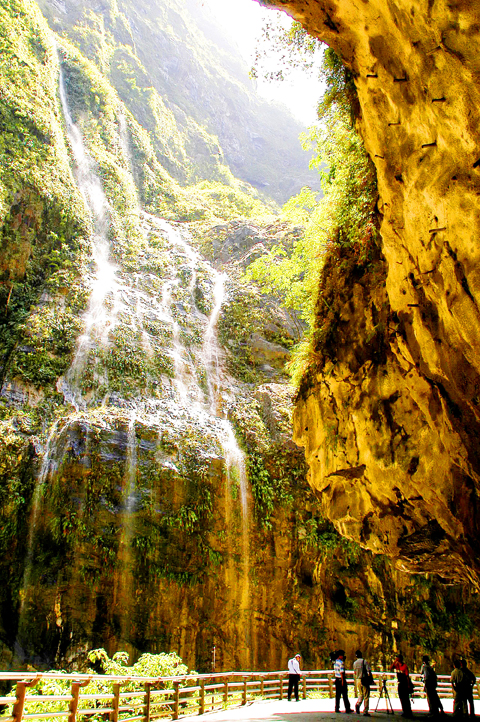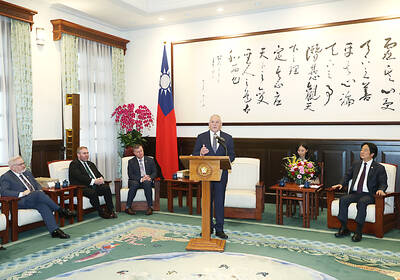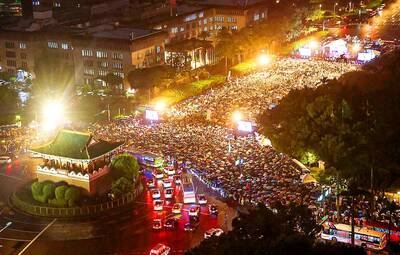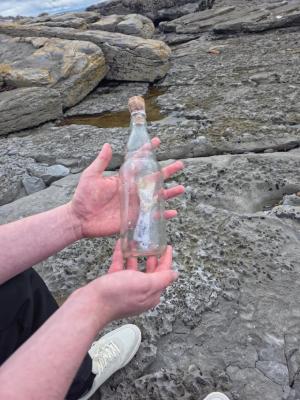Australian Brett Davies has backpacked his way around Taiwan several times in the past three years. One of the things he enjoyed the most was riding a scooter from Taipei along the scenic northeast coast and then continuing down the east coast to visit Taroko Gorge National Park.
“And what is really awesome is riding back to Taipei from Hualien, through the mountains, from Ilan, along Provincial Highway No. 9,” Davies said in an interview with the Taipei Times. “When I eventually arrived at Sindian (新店) and saw the first red traffic light, I said to myself: ‘That was so cool, but now I’m back in the city with all the people, the noise, the traffic and the fun!’”
While other overseas visitors may have similar travel experiences, the nation has not had much success in attracting a large number of backpackers or individuals who do not come with packaged tour groups.

PHOTO: YOU TAI-LANG, TAIPEI TIMES
“For a while, the overall environment in Taiwan was not very friendly to overseas visitors,” said Jessica Huang (黃雅智), CEO of the Chinese Taipei Youth Hostel Association (CTYHA). “Most of the tourist information was unclear, inadequate and was only available in Chinese. The English translation was horrible as well.”
POOR MARKETING
The nation didn’t do a good job of marketing its tourist attractions internationally, so not many overseas tourists wanted to visit, she said.
However, Huang added that things began to change four years ago, when the government launched a cross-departmental campaign to boost the number of tourists. The Tourism Bureau started to look at tourist attractions around the nation and sought creative ways to advertise them. Only then did promoting tourism become part of the national agenda, Huang said.
Lately, besides focusing on attracting more Chinese tourists, the Ministry of Transportation and Communications (MOTC) has also begun to tap into the underexploited backpacker market. Statistics from the Tourism Bureau showed that the nation has plenty of room to grow when it comes to backpacker tourism.
LACKING YOUTH
More than 3.7 million overseas visitors came to Taiwan last year. Those between 10 to 29 years of age — the group most likely to include backpackers — only accounted for about 24 percent of the total visitors.
Among the young travelers, about 84 percent came from Asia.
In July, the Taiwan Railway Administration teamed up with the CTYHA to put together a NT$1,999 summer travel deal for young backpackers in Taiwan that includes a seven-day railway pass and a one night stay at a local youth hostel.
MOTC chief Mao Chi-kuo (毛治國), who proposed the deal, said the long-term goal was to attract more backpackers from overseas.
“The youth travel market … accounts for about a quarter of the global travel population,” he said in July. “And if a person visits a certain place when he is young, it is very likely that he will revisit the same place again many times throughout the course of his life.”
Despite a more aggressive marketing strategy, the nation faces several challenges as a late bloomer in the market, as well as geographic disadvantages.
“It’s not directly on the Asian backpackers’ path, so a budget flight is necessary for most backpackers,” Davies said, adding that a lack of inexpensive travel accommodation is another reason why Taiwan has trouble attracting backpackers.
“To a backpacker thinking about accommodation, Taiwan is just as expensive as Singapore and Australia,” he said. “And for the price, the quality is not so great.”
TAIWAN VS THAILAND
He said that hostels and guesthouses in small scenic places outside Taipei charge at least NT$500 for a bed, while travelers only have to pay NT$200 to NT$250 for similar accommodation in Thailand.
Canadian Marc Chalifoux, who lived in Taiwan for five years and traveled extensively while he was here, also said the nation was not known to backpackers as a tourist destination.
“My friends would almost always get Taiwan and Thailand confused when I spoke of my travels, clearly because Thailand has such a high profile and is in vaguely the same part of the world,” Chalifoux said.
“Mirroring Taiwan’s presence on the international stage, Taiwan the tourist destination always seems to slip below the radar,” he said.
While many have expressed their satisfaction with the MRT system or inter-city bus systems, transportation is still seen by some as a major issue.
Sophia Lin, a student at the Taipei Medical University, went on an around-the-island railway tour with a friend once. She said many of the beautiful places in Taiwan are deep in the mountains, which can be reached neither by buses nor railways.
“Take Tanayiku (達納伊谷) for instance, a Tsou tribal village in Alishan, where the water is so clear that you can play with the fish. It’s beautiful, but there is no regular bus that goes that direction,” she said.
LACKING SOLUTIONS
While the government is aware of the shortcomings, it has not been able to address them in a successful, uncontroversial manner.
Although the Tourism Bureau has introduced the Taiwan Tour Bus package tours for individual overseas visitors, it was reported that the user rate was generally low and was considered to be too expensive.
Nonetheless, many feel that Taiwan should seize the opportunity to promote tourism among backpackers.
“If more infrastructure is developed, then at least Taiwan could start to gain a reputation amongst backpackers,” Chalifoux said.
Taiwan is so rich with geography, history and culture that it should be high up on any international adventurer’s list, he added.
“Especially now with global media giving so much attention to China, it is the right time to focus on a global advertising campaign to market Taiwan as a free, democratic society with compelling social and historical links to mainland China, yet distinct and unique in its own right,” he said.

‘NON-RED’: Taiwan and Ireland should work together to foster a values-driven, democratic economic system, leveraging their complementary industries, Lai said President William Lai (賴清德) yesterday expressed hopes for closer ties between Taiwan and Ireland, and that both countries could collaborate to create a values-driven, democracy-centered economic system. He made the remarks while meeting with an Irish cross-party parliamentary delegation visiting Taiwan. The delegation, led by John McGuinness, deputy speaker of the Irish house of representatives, known as the Dail, includes Irish lawmakers Malcolm Byrne, Barry Ward, Ken O’Flynn and Teresa Costello. McGuinness, who chairs the Ireland-Taiwan Parliamentary Friendship Association, is a friend of Taiwan, and under his leadership, the association’s influence has grown over the past few years, Lai said. Ireland is

FINAL COUNTDOWN: About 50,000 attended a pro-recall rally yesterday, while the KMT and the TPP plan to rally against the recall votes today Democracy activists, together with arts and education representatives, yesterday organized a motorcade, while thousands gathered on Ketagalan Boulevard in Taipei in the evening in support of tomorrow’s recall votes. Recall votes for 24 Chinese Nationalist Party (KMT) lawmakers and suspended Hsinchu City mayor Ann Kao (高虹安) are to be held tomorrow, while recall votes for seven other KMT lawmakers are scheduled for Aug. 23. The afternoon motorcade was led by the Spring Breeze Culture and Arts Foundation, the Tyzen Hsiao Foundation and the Friends of Lee Teng-hui Association, and was joined by delegates from the Taiwan Statebuilding Party and the Taiwan Solidarity

An SOS message in a bottle has been found in Ireland that is believed to have come from the Taiwanese captain of fishing vessel Yong Yu Sing No. 18 (永裕興18號), who has been missing without a trace for over four years, along with nine Indonesian crew members. The vessel, registered to Suao (蘇澳), went missing near Hawaii on Dec. 30, 2020. The ship has since been recovered, but the 10 crew members have never been found. The captain, surnamed Lee (李), is believed to have signed the note with his name. A post appeared on Reddit on Tuesday after a man

Instead of threatening tariffs on Taiwan-made chips, the US should try to reinforce cooperation with Taiwan on semiconductor development to take on challenges from the People’s Republic of China (PRC), a Taiwanese think tank said. The administration of US President Donald Trump has threatened to impose across-the-board import duties of 32 percent on Taiwan-made goods and levy a separate tariff on semiconductors, which Taiwan is hoping to avoid. The Research Institute for Democracy, Society, and Emerging Technology (DSET), a National Science and Technology Council think tank, said that US efforts should focus on containing China’s semiconductor rise rather than impairing Taiwan. “Without